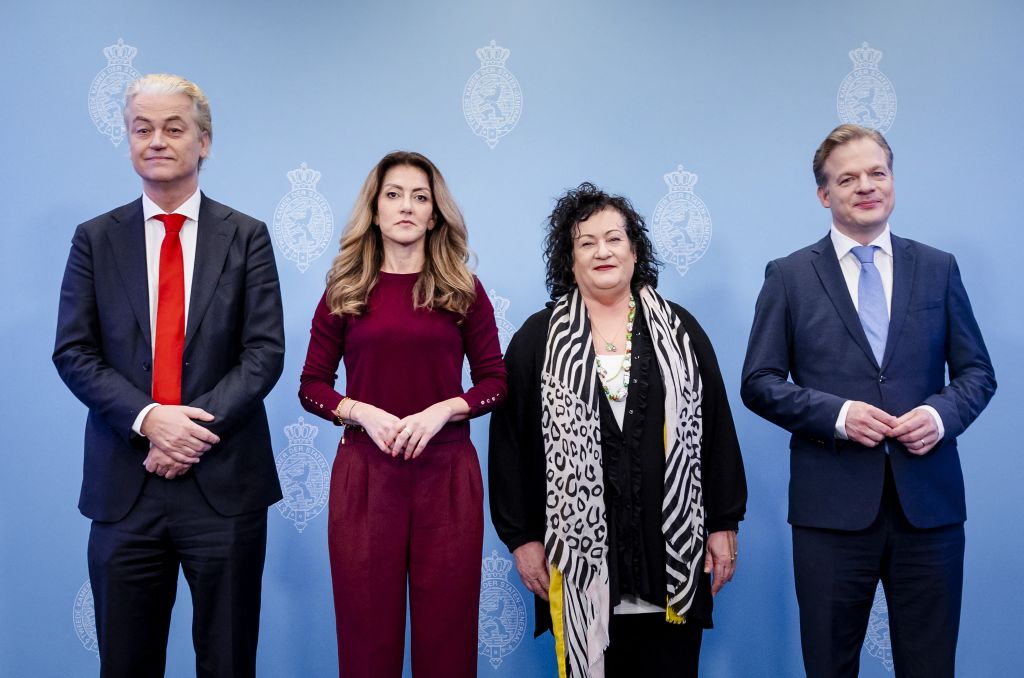“We are writing history,” said Dutch Right-wing leader Geert Wilders, announcing the new Dutch coalition yesterday. “The PVV [Party for Freedom], my own party, is coming into government, into the centre of power and we are enormously proud of this. At a stroke, we go from being the biggest opposition party to the biggest party of government.”
An experimental Right-wing coalition, for the first time including this radical party in the heart of power, has provoked mixed reactions in the Netherlands — until recently one of the world’s most outward-looking economies.
After winning the largest share of MPs in a shock last-minute swing last November, largely on an “asylum stop” ticket, Wilders bagged 37 of 150 MPs and the first right to attempt a coalition. But it has been a bumpy six-month process to form an uneasy accord with the centre-right People’s Party for Freedom and Democracy (VVD), the pro-reform New Social Contract (NSC), and the Farmer-Citizen Movement (BBB).
Three of the four parties have never before been part of government. For the past decade, after his disastrous confidence-and-supply role in a 2010 administration and increasingly inflammatory rhetoric, Wilders was formally excluded as a potential partner by the major Dutch parties.
He still has a criminal record for insulting Dutch Moroccans as a group, while his manifesto contained unconstitutional pledges to ban Islamic schools, mosques and the Qur’an, and hold a referendum on leaving the EU. To achieve any kind of government, Wilders promised to respect the constitution, said he would put his anti-Islam views “on ice”, and symbolically withdrew three law proposals which had effectively been shelved anyway. But this is no ordinary administration, even in a country used to a “polder” model to bridge differences.
The price of cooperation, demanded by Pieter Omtzigt’s NSC, is a new kind of technocratic government. Half of the ministers will be recruited from business. The four party leaders will sit in parliament, heading their own parties. What’s more, although the convention is for the largest parliamentary party’s leader to become prime minister, Wilders did not succeed in winning enough cross-party confidence to take the role. The yet-to-be-announced PM will instead be an appointment.
The agreement reads like a strange hotchpotch of initiatives — many of them already government policy. Like a Jackson Pollock-inspired collective, the four parties have each dripped pledges on the page, and it’s clear who wrote each one. The BBB wants to free farmers from European pollution legislation so they can “earn their crust”. Omtzigt’s pledges for more representative parliament, better scrutiny and more separation from the judiciary read like an academic essay. The VVD has slipped in pro-business measures to reduce taxes and regulation. And Wilders is behind the “strongest ever” asylum policy.
Many PVV voters and farmers seem pleased with the agreement, which promises a two-year “asylum crisis law” with a stop on application processes, “more rudimentary” asylum accommodation, and stronger expulsion measures, plus the reversal of a law to spread applicants across the country and remove refugee priority rights for social housing. Others praised a rule to return 80 mph speed limits to the roads and halve health compulsory excess costs from 2027.
But Wilders’s voters could be disappointed. The theme throughout the coalition is that the government will have to ask Europe for permission — for example, for an opt-out on the migration pact, permission to declare this crisis law, or to change rules around nature and nitrogen-compound pollution from farms and transport. “Brussels will see you coming,” said former EU heavyweight Frans Timmermans, now head of the GreenLeft-Labour alliance. “Honestly, it is not going to happen.”
Wilders is the longest-serving MP in the Netherlands, a highly-skilled strategist capable of communicating in simple terms with a large voting public. It was easy for his populist rhetoric to hook a quarter of a Dutch population disaffected after unpopular Covid lockdowns and a series of government scandals, not to mention suffering a housing and cost-of-living crisis.
His problem may well be that the public skills which make him a consummate opposition politician — sniping from social media, stand-up performances to put down his rivals, using the police service to complain about political enemies — are simply not the tools of a diplomat who must build cross-party alliances. You can’t run a government without them: three-quarters of voters did not vote for Wilders, and this coalition has no Senate majority.
Although he has three convenient partners to blame, Wilders’s true effectiveness as a politician is now on trial. “The Netherlands will be safer, and the sun will shine again,” he said on Thursday morning. “The Netherlands will be ours again.”
But with financial cutbacks ahead, concerns that the proposals will damage the investment climate and exacerbate skilled personnel shortages — leaving the field open for London to take back companies that fled for Amsterdam after Brexit — plus uneasy personal relations in the coalition, a big question remains. Namely: how long before the dark clouds loom?










Join the discussion
Join like minded readers that support our journalism by becoming a paid subscriber
To join the discussion in the comments, become a paid subscriber.
Join like minded readers that support our journalism, read unlimited articles and enjoy other subscriber-only benefits.
Subscribe